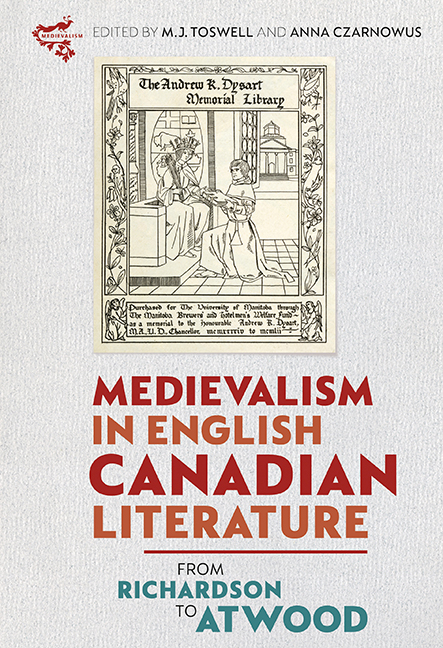Book contents
- Frontmatter
- Contents
- Introduction: English Canadian Medievalism
- 1 “Men of the North”: Archibald Lampman's Use of Incidents in the Lives of Medieval Monarchs and Aristocrats
- 2 “Going Back to the Middle Ages”: Tracing Medievalism in Julia Beckwith Hart's St. Ursula's Convent and John Richardson's Wacousta
- 3 John Richardson's Wacousta and the Transfer of Medievalist Romance
- 4 A Canadian Caliban in King Arthur's Court: Materialist Medievalism and Northern Gothic in William Wilfred Campbell's Mordred
- 5 Orientalist Medievalism in Early Canadian Periodicals
- 6 The Collegiate Gothic: Legitimacy and Inheritance in Robertson Davies's The Rebel Angels
- 7 Earle Birney as Public Poet: a Canadian Chaucer?
- 8 “That's what you get for being food”: Margaret Atwood's Symbolic Cannibalism 129
- 9 Lost in Allegory: Grief and Chivalry in Kit Pearson's A Perfect, Gentle Knight
- 10 Remembering the Romance: Medievalist Romance in Fantasy Fiction by Guy Gavriel Kay and Charles de Lint
- 11 Medievalisms and Romance Traditions in Guy Gavriel Kay's Ysabel
- 12 The Medieval Methods of Patrick DeWitt: Undermajordomo Minor
- Index
- Miscellaneous Endmatter
10 - Remembering the Romance: Medievalist Romance in Fantasy Fiction by Guy Gavriel Kay and Charles de Lint
Published online by Cambridge University Press: 25 March 2020
- Frontmatter
- Contents
- Introduction: English Canadian Medievalism
- 1 “Men of the North”: Archibald Lampman's Use of Incidents in the Lives of Medieval Monarchs and Aristocrats
- 2 “Going Back to the Middle Ages”: Tracing Medievalism in Julia Beckwith Hart's St. Ursula's Convent and John Richardson's Wacousta
- 3 John Richardson's Wacousta and the Transfer of Medievalist Romance
- 4 A Canadian Caliban in King Arthur's Court: Materialist Medievalism and Northern Gothic in William Wilfred Campbell's Mordred
- 5 Orientalist Medievalism in Early Canadian Periodicals
- 6 The Collegiate Gothic: Legitimacy and Inheritance in Robertson Davies's The Rebel Angels
- 7 Earle Birney as Public Poet: a Canadian Chaucer?
- 8 “That's what you get for being food”: Margaret Atwood's Symbolic Cannibalism 129
- 9 Lost in Allegory: Grief and Chivalry in Kit Pearson's A Perfect, Gentle Knight
- 10 Remembering the Romance: Medievalist Romance in Fantasy Fiction by Guy Gavriel Kay and Charles de Lint
- 11 Medievalisms and Romance Traditions in Guy Gavriel Kay's Ysabel
- 12 The Medieval Methods of Patrick DeWitt: Undermajordomo Minor
- Index
- Miscellaneous Endmatter
Summary
SINCE WILLIAM MORRIS'S Victorian prose romances, followed by Robert E. Howard's Conan the Barbarian series, Clive Staples Lewis's The Chronicles of Narnia and John Ronald Reuel Tolkien's The Lord of the Rings, images of the Middle Ages have flourished in fantasy literature, becoming a sort of default setting for much of epic and heroic fantasy. While Tolkien's and Lewis's medievalism is inarguably influenced by their authors’ philological background in medieval literature and culture, many representations of the Middle Ages in contemporary fantasy owe less to meticulous historical or literary research than to a sort of shared imagination of ‘the medieval’ that manifests itself across various phenomena of popular culture and typically includes feudal social structures, questing knights who follow (or not) chivalric ideals, and noble damsels in distress. This popular strand of medievalism, assembled over generations from stock images and clichés, has been labelled by Umberto Eco as “fantastic neomedievalism,” or even more derisively as “the avalanche of pseudo-medieval pulp in paperbacks,” which has little to do with the ‘real’ Middle Ages, which are, according to one Italian novelist and academic, a proper object of “responsible philological examination.” Over the last couple of decades, however, responsible philological examination has extended its scope to examine popular representations of the medieval within a growing field of medievalism studies.
In the introduction to a collection of essays on the representation of the Middle Ages in popular culture David W. Marshall remarks that “medievalism interrogates how different groups, individuals, or eras for various reasons, often distortedly, remember the Middle Ages” (italics mine). The issue of remembering in the context of medievalism is not further developed, yet Marshall's observation proves an inspiring starting point, as it draws our attention to the conceptual interrelatedness of memory and medievalism. If we further acknowledge that memory and literature rely on similar dynamic strategies of selecting, organizing, and re-accentuating individual elements to form a coherent narrative, we can see fantasy literature as one of many forms of recalling the Middle Ages in contemporary culture. The following discussion will aim to demonstrate that despite numerous differences, Guy Gavriel Kay's medievalist historical fantasy A Song for Arbonne (1992) and Charles de Lint's urban fantasy Yarrow: An Autumn Tale (1986) actively “remember” the patterns and themes of medieval romance to weave meanings pertinent to contemporary readers.
- Type
- Chapter
- Information
- Medievalism in English Canadian LiteratureFrom Richardson to Atwood, pp. 155 - 171Publisher: Boydell & BrewerPrint publication year: 2020

